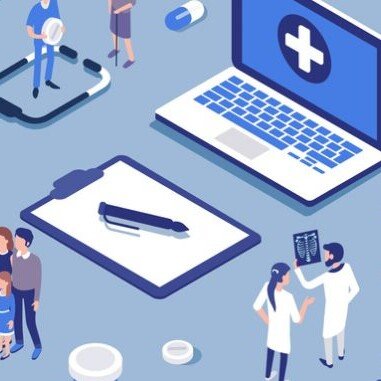1. Health/Clinical informatics specialist
A health informatics specialist works with patient records, focusing on improving patient care, enhancing health outcomes, and strengthening doctor-patient relationships. They usually have backgrounds in both healthcare and clinical informatics and are employed by healthcare providers such as hospitals and clinics, medical device manufacturers, pharmaceutical companies, etc Depending on the employer, size of the organization, and job description, the role can mean different things to different employers. Their duties include:
- Consulting with health informatics managers to determine the scope of information technology in an organization.
- Designing health systems and platforms to improve workflow
- Troubleshooting malfunctions in health system platforms
- Educating health professionals and other staff on the correct use of health systems.
- Processing and subsequent analysis of collected health data
- Ensure the installation of all software updates when available.
- Maintain health data security and prevent cyber threats
2. Health/Clinical informatics manager
Clinical informatics managers essentially manage health informatics specialists under them or observe their roles, depending on the size of the health organization. They serve as the bridge between the IT department and the rest of the healthcare organization, a position that requires knowledge of healthcare operations, information technology, business operations, and leadership skills. They carry out research using their understanding of healthcare to develop better ways to improve services. Their job combines patient interaction and problem-solving using information technology thereby supporting health professionals in ensuring that key information systems function properly. Their duties include:
- Use information from health data analysis to develop solutions to improve healthcare delivery.
- Develop health data visualizations to educate health professionals as regards patient information following patient data analysis
- Collaborate with health organization departments to implement cost efficiency and improved ways of delivering healthcare.
- Troubleshoot malfunctions in health system platforms
- Organize the collection of feedback from users on the user-friendliness of health technology systems
- Bridging the gap between the information technology department and other staff in the organization
- Intimate the IT department with the needs of health professionals towards designing better tools for them
- Supervises other clinical informatics specialists in their team, depending on the size of the organization
3. Health Informatics Consultant
These are health informatics professionals employed by health or non-primarily health organizations on a contract basis to advise the organization on all matters relating to health informatics. These organizations usually require insight into health informatics during any of their health-related projects and hire the services of a consultant to advise them during the course of the project. They are more of free agents as regards the health informatics field, as they enjoy more freedom of where to work and what projects to work on. They are usually not full-time employees, unlike clinical informatics specialists and managers. Their roles vary greatly, depending on the needs of the organization. Their duties include:
- Developing health data visualizations to educate organizations on better healthcare measures.
- Ensure that federal data privacy and protection regulations are being followed in handling patient data
- Training teams of health professionals on the use of information technology in healthcare
- Work closely with the organization’s IT staff in designing and operating needed informatics platforms.
- Installing, maintaining, and updating health organization’s system networks and databases
- Troubleshooting malfunctions in health system platforms
4. Chief clinical/medical information officer (CCIO/CMIO)
Sometimes referred to as Director of Medical Informatics or Chief Health Informatics Officer (CHIO), the role requires experience in clinical practice, team leadership, and health informatics skills. In some organizations, the newer CHIO role is used for innovative informatics roles in place of the older CCIO/CMIO roles. The position is an executive responsibility, usually reserved for health informatics experts with a medical degree (M.D.), who oversees all of a health organization’s projects related to patient data processing towards better healthcare outcomes. These directors combine their technology expertise with leadership skills to integrate and ease the flow of patient information across several healthcare divisions. Their duties include:
- Oversee the design of medical databases and perform needed database operations
- Ensuring compliance with health data privacy laws in the health data processing
- Ensure the generation of quality health data
- Educates clinical health professionals to understand and work with information technology
- Health data analytics and data visualization
- Analyze health data to measure the efficiency of healthcare services
- Stays on top of newer technologies that are available for use in healthcare
- Supervises the development of health platforms e.g. electronic patient records, telemedicine, etc.
5. Health Information Technology (HIT) Project Manager
These are project managers who work on health informatics platforms, and their responsibilities include initiating, planning, executing, monitoring, and closing health informatics projects. They do not need to have a healthcare academic background to perform their duties effectively.
Others
- Clinical informatics analyst
- Administrative assistant in clinical informatics
- Pathology links manager
Obisesan Damola
Damola is a medical doctor who has worked in the Nigerian healthcare industry for a little over 3 years in a number of primary, secondary, and tertiary hospitals. He is interested in and writes about how technology is helping to shape the healthcare industry. He graduated from the College of Medicine, University of Ibadan, the foremost medical training institution in Nigeria.



